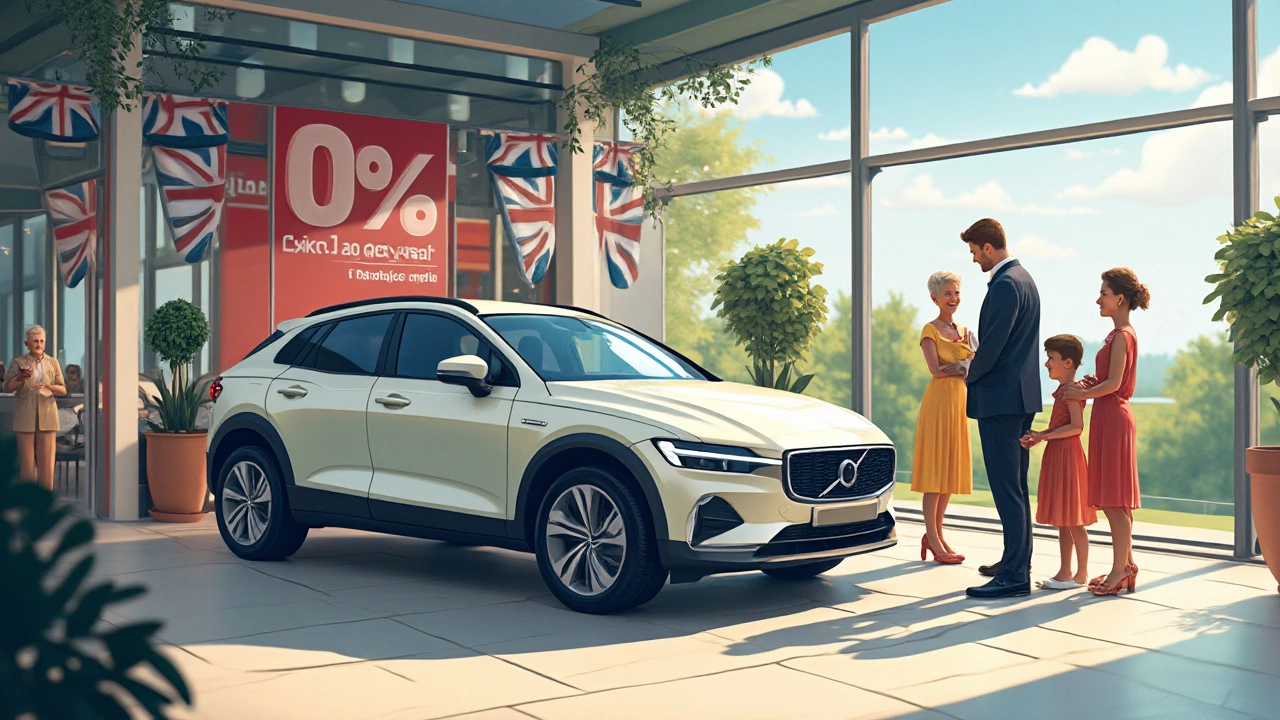When it comes to buying a car, one of the big questions you might face is whether to put money down when financing. This decision isn’t just a simple calculation—it involves understanding your financial landscape, potential loan terms, and the implications on your monthly budget. The process can be overwhelming, but gaining clarity on this topic can help you navigate the complexities of car loans with more confidence.
In the world of car finance, a down payment isn't just about lowering the amount you’ll owe; it’s a strategic move that can have lasting impacts on your financial health. For some, it's an essential step to secure better loan conditions. For others, it might be wiser to hold onto that cash. Whether you’re a first-time buyer or someone exploring new options, knowing the ins and outs of putting money down can be a game-changer in optimizing your car purchasing experience.
- Understanding Car Financing
- Benefits of Making a Down Payment
- Drawbacks of Paying Upfront
- Evaluating Your Financial Situation
Understanding Car Financing
Car financing is a powerful option for many individuals looking to purchase a vehicle without having the total purchase amount in hand. Essentially, it involves borrowing money, usually from a bank or financial institution, to acquire a car. The process starts with the potential buyer determining how much they can afford each month, which hinges on a variety of factors including income, existing debt, and credit score. Credit scores, in particular, play a crucial role, as lenders use this metric to gauge your ability to repay the loan. With a higher credit score, you could benefit from lower interest rates, making your car financing more affordable over time.
Once you've determined your affordability, the next step is selecting the right lender. It's important to shop around because rates can vary widely between different institutions. Some might offer attractive interest rates, while others propose flexible repayment terms. It's crucial to balance these aspects against your financial picture. An interesting fact is that some car manufacturers offer what's known as 'captive financing.' These are loans provided directly by the car manufacturer to help buyers purchase their models. Often, these might come with promotional interest rates but be cautious, as the terms may not fit every financial situation.
After choosing a lender, you dive into the loan terms. These typically include the interest rate, loan duration, and monthly payment breakdown. The interest rate reflects the cost of borrowing that money, so a lower rate means paying less over the loan’s life. The loan duration, often between three to seven years, affects how much you'll pay monthly. A longer term reduces monthly payments but might increase total interest costs. Engaging with your lender about each aspect of the car financing ensures clarity. As financial expert Dave Ramsey once said in an interview, "Understanding the ins and outs of your loan can save you money and headaches."
Let's talk about the impact of down payments. While some might think of it as a mere requirement, making a down payment can significantly influence your car financing journey. A larger up-front payment reduces the amount you need to borrow, which can decrease your monthly payments and the interest you pay in the long run. It also provides immediate equity in the vehicle, which can be advantageous if, for some reason, you need to sell the car early. However, it's essential to balance this with maintaining enough cash reserves for emergencies and unforeseen expenses.
Understanding Interest Rates
Interest rates are a core piece of the puzzle in car financing. A solid understanding of how they function can aid in making informed decisions. Rates are primarily determined by economic conditions, your credit score, and the type of car you plan to buy. New cars often have lower rates compared to used ones due to the perceived risk associated with older vehicles. It’s worth noting that economic shifts can lead to fluctuations in rates, which might require timely decision-making. For instance, if rates are expected to rise, locking in a loan earlier could prove beneficial. On the other hand, staying updated with the market trends allows you to renegotiate terms or refinance if conditions become more favorable.
Understanding car financing involves diving into the specifics of how finances work in the auto industry. From choosing the right lender to grasping the nuances of interest rates and the strategic use of down payments, every step requires careful consideration. Successfully navigating this process ensures that the excitement of owning a new vehicle is not overshadowed by financial strain.

Benefits of Making a Down Payment
Making a down payment when purchasing a car can be a wise financial move that offers a variety of benefits. One of the most immediate advantages is the reduction in the total amount you need to finance. By paying a portion of the car's price upfront, you directly decrease the loan amount, which can dramatically impact your monthly payments. Over time, this reduction can translate into significant savings on interest, making it easier on your wallet. Securing a lower car loan also means that you’ll potentially have a shorter loan term, allowing you to pay off your vehicle sooner and freeing up personal finances for other expenses or investments.
Another compelling reason to consider a down payment is its potential to secure a better interest rate. Lenders often see borrowers who are able to make upfront payments as less risky. This is based on the idea that if a borrower has savings to put down initially, they are more likely to manage their finances responsibly throughout the loan's life. With a lower interest rate, the cost of borrowing decreases significantly, which can result in thousands of dollars saved over the duration of the loan. According to a recent report from LendingTree, buyers who made larger initial payments could see their interest rates decline by 0.5% to 1.0%, which is quite substantial over a typical 60-month loan period.
“Down payments are not simply a requirement, they are an opportunity to build equity faster,” notes auto finance expert, Jane Howard.
Additionally, making a car down payment helps in building equity right from the start. This initial investment in your vehicle reduces the probability of becoming upside-down on your loan. An upside-down loan is when you owe more on your car than its current market value, which is a tricky situation if you plan to sell or trade in your car before paying off the loan. Equity is a crucial consideration for those who see their vehicles as a step towards larger financial goals, like buying a home or investing in a diversified portfolio.
Another key advantage of making a down payment involves better negotiating power and potentially more favorable loan terms. Dealers and financial institutions are often more willing to negotiate with buyers ready to make these payments upfront. This might result in non-monetary benefits such as fewer fees, lower insurance costs, or optional add-ons at no extra cost. It might seem that achieving this is a rare reward, but those who can demonstrate the ability to pay upfront are more likely to receive offers that would be unavailable to someone financing the full amount.
Lastly, individuals with poor or limited credit histories might find that a substantial down payment can play a critical role in loan approval. For lenders, such payments can outweigh the risks associated with a borrower’s credit profile. In essence, being prepared to make an upfront payment can become a strategy that opens doors to ownership opportunities that would otherwise be shut. A study by Experian concluded that borrowers with scores below 600 were 15% more likely to gain loan approval when they made down payments of at least 10% of the car’s value. So, for many aspiring car owners, this pre-loan action can act as a credit reputation buffer.

Drawbacks of Paying Upfront
Shedding light on the potential drawbacks of making a large down payment in car financing is essential for every aspiring car owner. While it may seem intuitive to pay as much as possible to reduce your loan amount, several unforeseen factors could make this a less favorable option. A down payment means parting with a significant amount of cash, which could otherwise act as a buffer for emergencies or other investments. Given the unpredictable nature of financial circumstances, keeping liquid cash can prove to be very advantageous. It allows flexibility, offering a cushion that can fund unforeseen expenses or opportunities that may arise.
Additionally, the immediate depreciation of a car's value should be considered. The moment you drive a new car off the dealership lot, its worth takes a hit—a well-known fact among automobile enthusiasts. According to an analysis by Edmunds, a car can lose about 20% of its value in the first year alone. This depreciation means that your large upfront investment might not hold its weight for long, potentially locking your funds into a rapidly devaluing asset. Economists often advise weighing the immediate advantages of a down payment against the rapid depreciation rates.
Moreover, in the event that a borrower defaults on their auto loan, having made a sizeable down payment doesn't necessarily offer any advantage in recovering those funds. The lender typically seizes the vehicle in such cases, potentially leaving the buyer without a car and out of pocket. A slight delay or inability to continue payments due to unforeseen financial strains could result in loss without any protection for the pre-paid amount. The risk, therefore, is worthy of contemplation prior to committing to an extensive upfront payment.
In some scenarios, consumers might be tempted to remit their entire savings as a down payment in order to get a better deal on the loan in terms of interest rates and lesser monthly payments. However, this choice could strip them of liquidity to cover other vital expenses, like home repairs, unexpected health care costs, or sudden emergencies. As the saying goes, "Don't put all your eggs in one basket," diversifying your financial commitments rather than draining into a single asset might be a more cautious choice.
As financial expert Suze Orman advises, "Before dedicating your savings to a down payment, make sure you are not compromising your emergency fund." Assessing your own personal finances and future necessities carry as much weight as the immediate conditions of the borrowing deal.
Finally, in the evolving landscape of automobile technology, holding onto cash might give flexibility for leveraging future options, such as switching to newer models or opting for eco-friendly cars. Technological advancements have been progressing swiftly, and tying up all your money in a current model may limit your options down the line. Flexibility, both financially and in terms of assets, can be a major advantage, especially as the auto industry continues to innovate rapidly.

Evaluating Your Financial Situation
When considering whether to make a down payment while financing a car, thoroughly evaluating your financial situation is crucial. Start by examining your current financial landscape, including your monthly income and expenditures. This analysis helps you identify how much you can realistically allocate toward a car payment without jeopardizing other financial obligations. A good rule of thumb is to keep your total car expenses, including payments, insurance, and maintenance, to no more than 15% of your monthly take-home pay.
Next, take a look at your savings. A substantial emergency fund should ideally be set aside before making a large purchase. This fund acts as a safety net for unforeseen events like medical emergencies or urgent home repairs. If committing a down payment significantly depletes your savings, it might be wise to reconsider or adjust the amount you're putting down. Protecting your financial security is as important as enjoying the benefits of a new vehicle.
Your credit score is another vital component in this evaluation. A high credit score can lead to more favorable loan terms, including lower interest rates. This, in turn, could lessen the necessity for a large down payment. According to many financial experts, borrowers with credit scores of 700 or above often receive better rates. John Smith, a prominent financial advisor, once stated,
"A strong credit score can save you thousands over the life of your auto loan."
Consider your future financial goals too. Are you planning for a significant expense, like purchasing a home, further education, or starting a business? If so, tying up too much money in a car might not align with your broader aims. Balancing immediate desires with long-term goals is always a delicate act but crucial for solid financial health.
Finally, compare different financing offers from banks, credit unions, or dealership loans. Each might come with varying interest rates, minimum down payment requirements, and flexibility in terms. Some lenders may offer special promotions, reducing your need for a hefty initial payment. Take time to compare these aspects. Choose the option that provides a balance between keeping your cash reserves intact and securing affordable monthly payments.
Having a holistic view of your financial standing provides the clarity needed to decide on putting money down when financing a car. The ultimate goal is to ensure that your decision not only makes sense for the present but is also beneficial for the future. So, take the time to evaluate these elements carefully before making a commitment.

